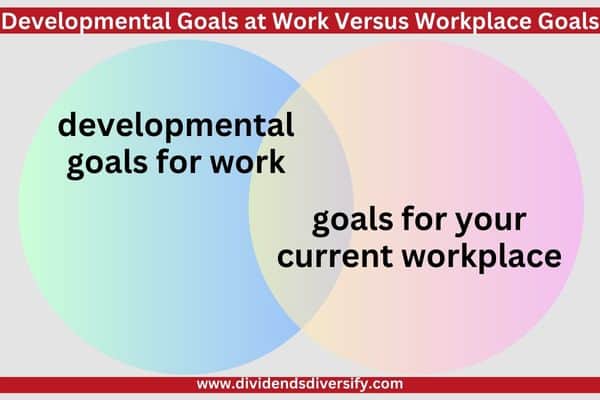Examining The Best Goals For Professional Development At Work
Today, let’s explore a range of possible developmental goals for work. Most importantly, the skills and objectives I will outline will benefit you no matter what you choose to do or where.
What’s the end objective?
Simple. The objective is to develop professionally and improve your long-term career prospects.
Let’s get moving.
Best Examples Of Developmental Goals For Work
Focus on these developmental objectives at work:
- Improve soft skills
- Embrace adversity
- Practice resilience
- Hone your judgment
- Network extensively
- Gain international experience
- Get cross-functional training
- Increase efficiency
- Increase technical skills
- Work with a mentor
Next, I will highlight a vital distinction between work developmental goals and workplace goal setting for employees.
Then I will discuss the developmental goal areas indicated above. Also, outline dozens of development goals for work examples within each broad area.
Let’s do it.

Disclosure: At no cost to you, I may get commissions for purchases made through links in this post.
Developmental Goals at Work Versus Workplace Goals
As I indicated in the introduction, your developmental goals form the foundation for success in your career and at work. Most noteworthy, they are transferable skills that travel with you no matter what you do or where you are employed. Finally, developmental goals benefit your current employer, but only indirectly.
In contrast, workplace goals focus on your current employer or organization. These goals directly benefit your company’s business, productivity, and profit. For example, increase sales, reduce expenses, or lead a project team for your current organization.
Yes, there is an overlap between these two goal-setting areas. However, they are distinctly different, as indicated in the diagram below.

Here, you can read more about setting workplace goals, including examples.
Otherwise, please stick with me now as I review opportunities for setting developmental goals at work.
1. Improve Soft Skills
Improving your soft skills is an example of a developmental goal for work.
Why?
Soft skills are like the oil in an engine. The oil makes the engine run and ensures it runs smoothly.
And that’s what your soft skills do for you at work.
Thus, focus on these objectives every day to improve your soft skills:
- Communicate clearly and concisely
- Collaborate effectively
- Listen attentively
- Carry yourself professionally
- Practice positive thinking
- Master presentation skills
- Run productive meetings
- Develop a growth mindset
- Become a better leader
2. Embrace Adversity
Accept that you will encounter difficult times and challenging situations. Misfortune, bad luck, poor timing, and fierce competition are part of the workplace.
So, it’s not about whether or not you will face adversity because you will. It’s how you deal with it that matters.
Thus, here are some tips for rising above the fray when the going gets tough:
- Understand the root cause
- Look for opportunities
- Make a plan to manage the problem
- Take action
- Be patient for results
- Enlist the support of others
3. Practice Resilience
Being resilient is essential when facing adversity. However, even in the best of times, you must be resilient.
Success is exhilarating but can bring on unique challenges. Furthermore, we all know people who have trouble handling success.
So in good times and bad, here are ways to be resilient at work:
- Accept that change happens
- Be flexible
- Stay grounded during good times
- Find the silver lining during bad times
- Focus on things you control
- Take care of yourself
- Look to others for support
- Do not give up
- But know when to cut your losses
- Improve your emotional intelligence
4. Hone Your Judgment
Sound judgment in the workplace separates the high-performers from everyone else. People rise through the ranks and have success because of having good judgment.
For me, judgment boils down to two critical concepts.
First, work on the right things, then second, work on those things you have identified the right way.
For example, have you ever observed a colleague in the workplace and asked yourself this question:
Why are they wasting time doing or working on that? If yes, you were questioning their judgment.
Think about it this way. Did Steve Jobs know that developing the iPhone was the right thing to do?
The answer is no.
However, Mr. Jobs tapped into his judgment and moved forward with developing, marketing, and selling the iPhone regardless. The rest is history.
Here are some ways to improve your judgment at work:
- Be objective
- Gather the facts
- Discuss your thoughts with others
- Tap into your instincts
- Make informed decisions
- Look back and reflect
- Learn from outcomes
- Look forward and anticipate
- Do not fear failure
5. Network Extensively
Networking is important on several levels. It can help you identify new opportunities, promote learning, and build credibility.
As the old saying goes, it’s not what you know. It’s who you know.
So, here’s how to be an effective networker:
- Be yourself
- Act professionally
- Give more than you take
- Show genuine interest in others
- Attend industry events
- Join professional organizations
- Tap into day-to-day contacts
- Be persistent
- Keep your contacts organized
6. Gain International Experience
Over the years, the business world has become more and more global. However, you don’t have to relocate overseas to get international experience.
For example, I didn’t want to live and work in a foreign country. But it didn’t stop me from getting international work experience.
Here are some ways to go about rounding yourself out as a worker with a global mindset:
- Travel internationally
- Work at a multinational company
- Take on an assignment in a foreign country
- Get an international support role at home
- Seek out a work professional development program
- Head up an international project team
7. Get Cross-Functional Training
Being well-rounded is essential to progress at work and throughout your career. So, yes, you must be an expert in your field. But also, you should have a good grasp of business.
Thus, consider these developmental goals at work to increase your overall expertise:
- Work on a production line
- Pick, pack, and ship in the warehouse
- Attend marketing meetings
- Participate in sales calls
- Work in customer service
- Go on service calls
- Shadow another department manager
8. Increase Efficiency
Next, you must increase your productivity because time is the great equalizer in a competitive world.
No one has more than 24 hours a day and seven days a week to achieve goals. So, here are some excellent ways to increase your productivity:
- Accomplish something first thing daily
- Keep your workspace organized
- Improve time management skills
- Create a to-do list
- Prioritize your activities
- Eliminate distractions
- Focus, focus, focus
- Rest when you need to
- Become a better manager
- Delegate effectively
9. Increase Technical Skills
Every job, profession, and trade requires unique technical skills. However, they differ depending on who you are, what you do, and where you work.
For example, an accountant at a Certified Public Accounting firm needs entirely different technical skills than a marketing professional at an advertising agency. Nevertheless, having personal development goals at work goals in this area is a must.
Thus, here are some examples of objectives to increase technical skills:
- Be an expert in your field
- Become a leader in your industry
- Improve problem-solving ability
- Increase computer proficiency
10. Work With A Mentor
The great thing about having an appropriate and high-quality mentor is that they can help you with many of the goals, objectives, and activities I have described throughout this post. Thus, I highly recommend finding a mentor that has successfully traveled the path you wish to follow.
Meet with your mentor periodically, ask them questions, and assess their advice for application to your situation.
You can receive mentoring in less formal ways too. For example, look to bosses, colleagues, employees, and people in your network.
When seeking out mentoring, make sure to:
- Be open to feedback
- Seek out constructive criticism
- Be a keen observer
- Take time to reflect
Okay. That concludes my thoughts about examples of developmental goals for work.
Next, please allow me to share some concluding comments. And before you go, pin this image to Pinterest so you can return again later.

Final Thoughts About Setting Good Developmental Goals For Work
Achieving developmental goals make you a better worker, propelling you to more extraordinary accomplishments throughout your career. The abilities you create from these goals travel with you no matter where you work or what you do.
Best Resources For Achieving Developmental Goals At Work
Finally, to help you along the way, consider taking one of these excellent online master classes:
Okay. That’s all I have for today.
So get busy setting goals, achieving goals, and becoming the best you can be at work.
And if you are hungry for more knowledge, check out our:
Goal and Goal-Setting Article Archives

Author Bio: Tom Scott founded the consulting and coaching firm Dividends Diversify, LLC. He leverages his expertise and decades of experience in goal setting, relocation assistance, and investing for long-term wealth to help clients reach their full potential.